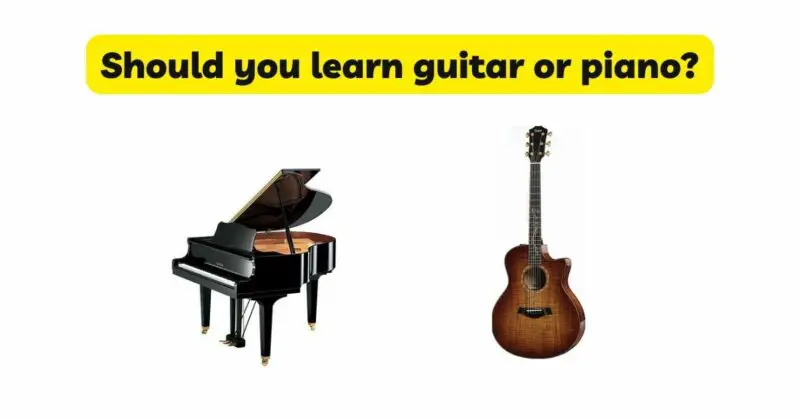Embarking on a musical journey is a thrilling endeavor that opens the door to creativity, self-expression, and personal growth. When faced with the decision of whether to learn the guitar or piano, aspiring musicians are often torn between the allure of both instruments. In this article, we will delve into the considerations and benefits of learning the guitar and piano, exploring factors such as versatility, learning curves, expressive potential, cultural significance, and personal preferences. By examining these aspects, readers can gain insights to help them make an informed choice regarding which instrument to pursue.
- Versatility: The Expansive Realm of Musical Genres: Both the guitar and piano have their strengths when it comes to versatility across different musical genres. The guitar’s ability to strum chords, play melodies, and create solos lends itself well to folk, rock, pop, blues, and various contemporary styles. The piano, with its wide range and polyphonic capabilities, can navigate classical, jazz, and popular music genres with equal ease. When considering versatility, it is essential to reflect on the genres that resonate with personal musical tastes and aspirations.
- Learning Curves: Technical Demands and Learning Paths: The learning curves of the guitar and piano differ, requiring consideration when making a choice. The piano demands precise finger coordination, hand independence, and an understanding of music theory and notation. It necessitates the mastery of complex techniques and the ability to read sheet music. On the other hand, the guitar requires finger strength, coordination, and an understanding of chord shapes and fretboard navigation. It benefits from accessible online resources and simplified chord charts. Personal learning preferences, such as visual vs. aural learning, may also influence the decision.
- Expressive Potential: Tapping into Emotions and Artistic Expression: The expressive potential of an instrument plays a vital role in connecting with audiences and conveying emotions. The guitar, with its strings that resonate with the player’s touch, allows for intimate expression through techniques like bending, vibrato, and slides. It excels in conveying raw emotions and personal storytelling. The piano, with its broad dynamic range and versatile tonal palette, enables musicians to create nuanced and intricate musical interpretations. It lends itself to capturing the depth and complexity of compositions across various genres.
- Cultural Significance: Exploring Musical Heritage and Legacy: Both the guitar and piano have rich cultural significance, shaped by their historical roles and associations. The piano’s legacy in classical music, its connection to renowned composers, and its place in concert halls evoke a sense of tradition and refinement. It carries a cultural weight and stands as a symbol of musical excellence. The guitar, with its roots in folk, blues, and popular music, embodies rebellion, self-expression, and the spirit of creativity. It has played a significant role in shaping popular culture and contemporary music.
- Personal Preference: A Key Factor in Musical Motivation: Personal preference is a crucial consideration when choosing an instrument to learn. The instrument that resonates with personal interests, musical preferences, and emotional connection will provide greater motivation and enjoyment throughout the learning journey. Some individuals may be drawn to the guitar’s versatility and its connection to their preferred musical genres, while others may feel a strong affinity for the piano’s expressive power and classical repertoire. Ultimately, choosing an instrument aligned with personal preferences fosters long-term dedication and commitment.
- Accessibility: Practical Considerations and Instrument Availability: Accessibility plays a practical role in the decision-making process. Guitars, particularly acoustic models, are generally more affordable and easily transportable compared to pianos. Guitars also come in different sizes and variations to accommodate different ages and body types. Pianos, on the other hand, require more space, financial investment, and maintenance considerations. Digital keyboards and portable pianos offer alternatives that address space constraints and provide a range of features and functionalities. It is crucial to assess the feasibility and accessibility of the instrument within one’s living environment.
- Musical Goals: Defining Aspirations and Pathways: Understanding personal musical goals is fundamental in selecting an instrument to learn. Reflecting on aspirations, such as performing in a band, composing, songwriting, or pursuing a solo career, can help determine which instrument aligns better with those goals. Guitarists often find themselves drawn to ensemble playing and performing in bands, while pianists may gravitate towards solo performance, accompaniment, or classical ensemble opportunities. Defining musical goals helps shape the learning path and focus efforts toward achieving specific milestones.
- Embracing the Journey: Exploring Both Instruments: While choosing between the guitar and piano is a significant decision, it is important to remember that the journey of musical exploration need not be limited to one instrument. Many musicians find fulfillment in learning multiple instruments over time, as each instrument brings its unique perspectives, techniques, and possibilities. Exploring both the guitar and piano at different stages of the musical journey can lead to a broader musical understanding, enriched creativity, and a well-rounded skill set.
Conclusion: Choosing between the guitar and piano is a subjective decision that depends on individual preferences, musical goals, learning curves, and personal aspirations. Both instruments offer unique opportunities for creative expression, self-discovery, and personal growth. The guitar’s versatility, intimate connection, and popularity across various contemporary genres appeal to many musicians. Simultaneously, the piano’s expressive potential, cultural heritage, and classical associations resonate with those seeking a rich and dynamic musical experience. Ultimately, the choice should reflect personal interests, musical aspirations, and the instrument’s capacity to inspire and bring joy throughout the musical journey.


